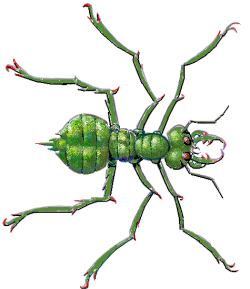Ranger ant
From Wikimalia
(Difference between revisions)
| Line 3: | Line 3: | ||
|name= Ranger Ant | |name= Ranger Ant | ||
|habitat= Remote regions, any but extreme cold. | |habitat= Remote regions, any but extreme cold. | ||
| - | |description= | + | |description=Primarly a mottled mix of greens and other dappled earth tones, this ant might easily blend into a jungle or forest canopy, despite its three-thum length. Its low squat body segments might go unnoticed were it not for the bright red eyes, mandibles and stinger, plus a number of hooks, spines and barbs that adorn its limbs. Able to scuttle along at astonishing speeds, it's easy to imagine that this insect could overtake and overcome animals. Even its dark antennae flicker with intent and menace. |
|collection= | |collection= | ||
|notes= The ranger ant is so named because they are rarely encountered, generally in remote locations, and almost invariably as single specimens, giving rise to speculation that like rangers, they become easily lost. More likely they are a solo predator, or a colonial hymenoptera with vast hunting territories. Large enough to fend well against even small rodents and lizards, their quarter-thum mandibles are capable of delivering vicious bites, which will not release even if the insect is decapitated. | |notes= The ranger ant is so named because they are rarely encountered, generally in remote locations, and almost invariably as single specimens, giving rise to speculation that like rangers, they become easily lost. More likely they are a solo predator, or a colonial hymenoptera with vast hunting territories. Large enough to fend well against even small rodents and lizards, their quarter-thum mandibles are capable of delivering vicious bites, which will not release even if the insect is decapitated. | ||
}} | }} | ||
Revision as of 18:17, 10 April 2008
| The Bug Collection | ||||||||
|---|---|---|---|---|---|---|---|---|
|
| ||||||||
| ||||||||

